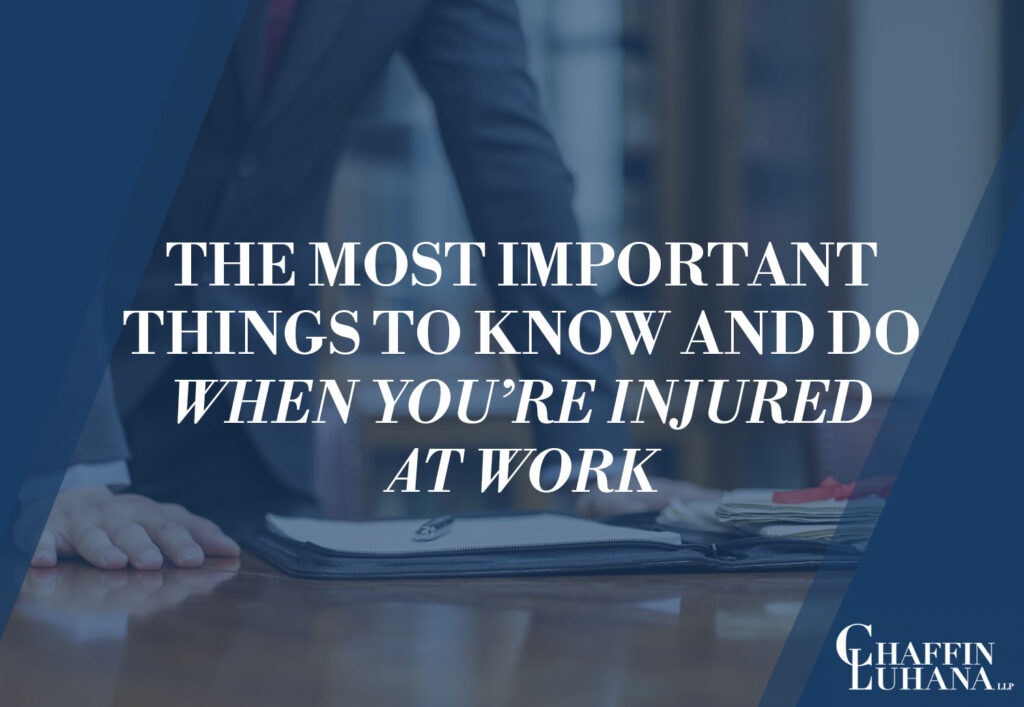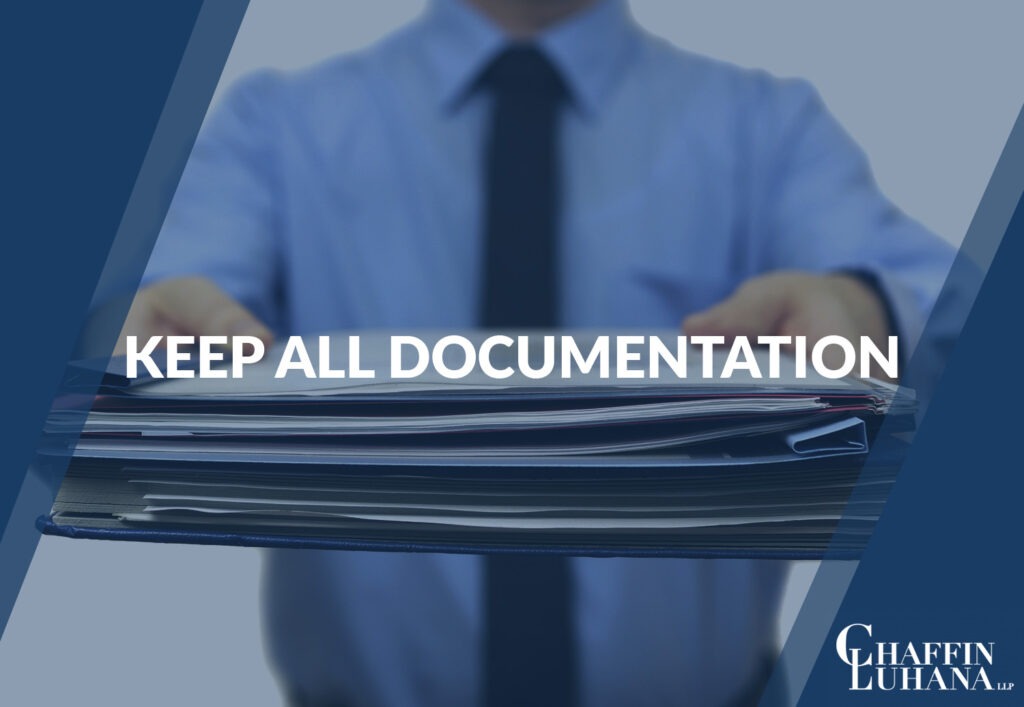
Getting injured is never fun, but suffering an injury while working can be extremely complicated and disruptive to your life.
In addition to the recovery time, dealing with trauma, and adjusting to any changes that have resulted from the injury, workplace accidents can introduce an entirely new layer of potential problems and pitfalls. Working with insurance companies, your employer, and the differing laws in your state can be a challenge all of its own.
Here are a few things to keep in mind and do if you are injured on the job.

1. Report it immediately
“Immediately” means immediately. The tricky thing about injuries, especially falls, is that not all of the injuries show up right away. Sometimes, people think it’s better to keep the accident from their employer or supervisor until actual problems make themselves known—the pain, fainting spells, and so forth. But this is the worst thing you can do.
Most states, and most individual employers in each state, have strict rules about the time window you have to report injuries. Why? Because the longer you wait, the harder it is to prove what actually happened, and to connect your injuries to the incident.
Even if you have been injured at work, oftentimes employers will not even accept reports that are filed more than 30 days after the accident is said to have occurred.
Failing to report a workplace injury within the required amount of time may not only result in a loss of benefits, but may also lead to other penalties
If you have been injured at work, and your employer denies your claim, and you have not filed a report within the required time, you could be slapped with a formal reprimand and even be suspended without pay, or even worse, fired.
Additionally, state laws differ on whether providing a workplace injury report to an immediate supervisor can be written or verbal. However, it is always a good idea to make a written report of everything that occurred. Documentation is extremely important.
Among the things you should include in ink on the injury form are:
- Your full name, home address, and job title.
- The specific time and date when the injury occurred.
- The specific location of the injury, including the floor, building, etc.
- A detailed description of the injury’s cause, including what you did before its occurrence and what you were doing when you got hurt.
- A description of when and how you began feeling pain, as this could indicate a serious tendon or bone injury.
- The names of any co-workers who were involved or who saw what happened.
Sign and date the report and request a copy for your personal records.

2. Get a copy of the accident report
Once you have submitted your report (and have ensured your supervisor has received it and is working on it), request a copy.
It is important that you have a copy of the report for yourself. Once you receive it, make sure to review it to ensure it says what you wrote and put it away safely and only take it out when it is necessary for lawyers, doctors, or other appropriate people to see it.

3. See the right doctor
This will also depend on your state. Some states insist companies work with a specific doctor and/or hospital (often this is tied to the insurance provider that is offered by your company).
This person is often referred to as the “Company Doctor.” Other times, you are allowed to see whatever doctor you like. It is very important to know which doctor you are legally allowed or required to see after a workplace injury, as seeing the wrong doctor can negatively affect your treatment and recovery.
When you have determined which doctor you can see, show them your incident report and describe in detail how it occurred, any injuries you sustained from it, and anything else that you feel has resulted from the incident itself.
Be honest with them; hiding injuries or making up others will only hurt you. If the doctor is less attentive or interested than you would like, it is okay to be persistent. You deserve appropriate treatment.
4. File for workman’s compensation
Not every employee can file for these benefits. It’s important to understand that filing for this kind of compensation is not a lawsuit; it is simply a formal, written request for financial benefits after an accident.
Agricultural workers, domestic employees, and independent contractors cannot generally file for workman’s comp. All other employees, however, are covered by the law and can at least request it.
The filing process typically looks like this: Once you have been injured and have informed your employer, request a workman’s comp form. Ideally, they should have given you one without you having to ask; they are required to do so by law.
Often, hospitals and doctor’s offices have the forms on hand, that will start the ball rolling. If for some reason your employer cannot or does not give you the form, contact your state Workman’s Compensation Office, which can be found here.
Complete only the “Employee” section. Be sure to sign and date the form, and keep a copy for your records (in the safe place you’re keeping your copy of the incident report). Once you have done this, return it to your employer either in person or by mail. If by mail, be sure to use certified mail so they have to sign for it.
Once your employer has completed the “Employer” section of the form, he or she will forward it to the workman’s compensation insurance company used by your employer. Your supervisor should give you a copy of the completed form.
Hang on to this as well. Generally, the insurance company is required to send you a letter within 14 days regarding the status of your claim and whether it was accepted or denied. If you do not hear from them within 2 weeks, call them.
Your employer is required by law to have workman’s compensation insurance. If they do not, speak with an attorney or with your state’s labor department or workman’s comp office. You may also be able to pursue a claim against your employer if they are required to have this kind of insurance and do not provide it.
5. Determine if you need a lawyer
Seeking out a personal injury attorney is usually a good idea, unless your injury is extremely minor or has no foreseeable impact on you or your family. Getting legal advice does not mean you must pursue a case, but knowing your legal options is often very helpful.
However, you absolutely should have a lawyer if:
- You have filed a claim in the required window and the insurance company, your employer, or both reject your claim for workman’s comp;
- Your employer will not offer you, or does not have, workman’s comp insurance;
- Your employer’s settlement offer does not cover all of your medical bills and lost wages;
- You have to stand before a court judge or otherwise require formal legal representation for actual proceedings;
- You have a preexisting condition;
- Your medical problems either prevent you from returning to your former job, or from working at all;
- You receive Social Security benefits for disability;
- Your employer retaliates against you for filing for compensation; or
- If you can sue a third party for injuring you while at work (e.g., a truck driver can sue a drunk driver for compensation in addition to getting benefits from his or her employer).
- Your state provides for in-court remedies for worker injuries, which are generally referred to as “deliberate intent” claims under state laws such as West Virginia.
Needing a lawyer depends on the particular complexities and nuances of your case. Sometimes it is okay to represent yourself, but for issues like the above, good legal representation is absolutely recommended.
Make sure to find a lawyer with extensive experience dealing with personal injury law, and who can point to happy clients who have been successfully represented.
6. Keep all documentation
Sadly, some employers are reluctant to do what is best for their employees. This includes ensuring a safe work environment and providing workman’s compensation to injured workers. This is why keeping documentation is so crucial—if you have to go to trial or submit a complaint to OSHA, you’ll have a concrete way of backing up how your injury occurred.
Besides any forms you fill out, doctors’ notes, and letters from the insurance company, it may also be a good idea to keep a record of the events as they transpire.
Document personally how you got hurt, what you did, and when. Make a note of the dates, topics, and outcomes of the conversations you have with your boss, your doctor, and the insurance company, as well as any legal or OSHA representatives.
Additionally, document everything your employer is doing to fix the problem that led to your injury, and if there was negligence on their part. If they fail to do this, having documentation will be very helpful if you request an OSHA investigation or seek legal action.
(For more on OSHA and when to involve them, visit here.)
Conclusion
Suffering from an injury not only affects you physically, but there are also emotional, mental, and financial repercussions. With persistence and help from an attorney, there can be a positive resolution. Knowing what to do and when to do it is half the battle. And knowing ahead of time—before you have been injured—can be more important than any insurance policy you could have.





